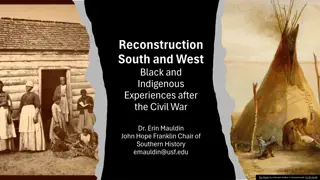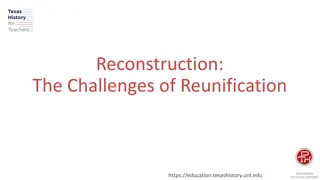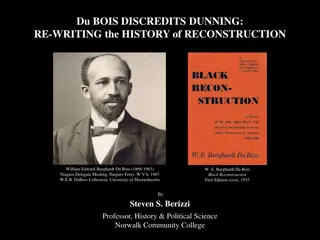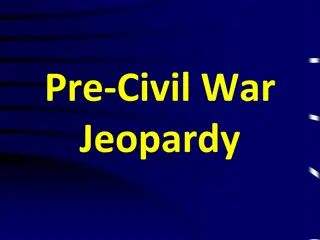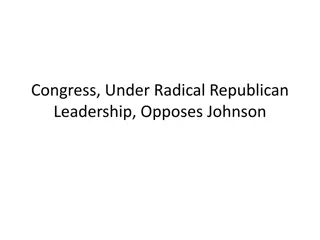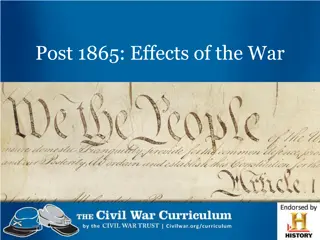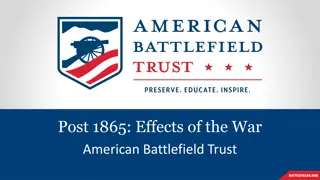Civil War and Reconstruction: Historical Study Materials
In this historical study material, you will find details about the Civil War battles, speeches, and the process of Reconstruction after the Civil War. The content covers key figures like President Lincoln and Andrew Johnson, the Freedmen's Bureau, Black Codes, and the quest for civil rights for freedmen. Explore significant dates, events, and actions shaping the post-Civil War era.
Download Presentation

Please find below an Image/Link to download the presentation.
The content on the website is provided AS IS for your information and personal use only. It may not be sold, licensed, or shared on other websites without obtaining consent from the author. Download presentation by click this link. If you encounter any issues during the download, it is possible that the publisher has removed the file from their server.
E N D
Presentation Transcript
Monday, April 24 (On Level) What do I do when I come in? 1. Get out your spirals 2. Update your table of Contents Date 4/11 4/12 4/18 Graphic Organizer: Civil War Battles 4/19 Notes: Civil War speeches 39 Title Entry # Cover Page: A House Divided Movie: Civil War 36 37 38 Warm-Up: Turn to entry # 36 and get out your Reconstruction packet 4. What am I doing today? a. No STAAR review b. Civil War/Reconstruction test c. STAAR folder
STAAR Folder Decorate your folder: Add the following: 1. Dates: 1607 Jamestown 1620 Mayflower Compact 1776 Declaration of Independence 1787 Constitution 1803 Louisiana Purchase 1861 1865 Civil War 2. Eras: Colonial no work, no eat Revolution no taxation without representation Constitution We the people Republic avoid political parties and stay neutral Westward Growth Sea to shining Sea Civil War United we stand, divided we fall
Reconstruction 1. Reconstruction the process of rebuilding the United States (mainly the Southern states) after the Civil War. I. Presidential Reconstruction 2. President Lincoln felt the Southern states should be treated with leniency. a. He felt the Southern states had never truly left the Union. b. Wanted to mendthe nation s wounds rapidly and did not want to punish the South. c. Sadly, Lincoln was assassinated before Reconstruction.
Reconstruction 1. Andrew Johnson became President upon the assassination of President Lincoln. II. President Johnson 2. LackedLincoln s character and loyalty. 3. Congress did not believe Johnson would be lenient to the South. 4. Johnson s plan: a. Follow Lincoln s plan! b. Sympathetic to poor southern Whites c. Recognize newly formed Southern state governments d. Pardon most rebel leaders
Reconstruction 1. 3.5 million slaves now had their freedom. (now called freedmen) a. What does the U.S. do? III. Black Codes 2. Freedmen s Bureau: a. Helped former slaves with food, clothing and medical care. b. Some agents were former Northern veterans c. Searched for lost family members during the slavery years d. Made slave marriages legal e. Opened schools to teach former slaves to read and write
Reconstruction f. Organized to demand civil rights for freedmen g. Voting rights for African American men III. Black Codes 3. Black Codes were based on former slave codes a. wanted to regulate the lives of the freedmen b. aim of the codes was to preserve traditional Southern society despite the abolition of slavery. c. illegal for freedmen to hold public office d. illegal to travel freely e. illegal to serve on juries
Reconstruction 1. Northerners were enraged by the elected Confederate leaders. IV. Congressional Reconstruction 2. Congress did not recognize the new Southern governments. 3. Radical Republicans a. northern congressman b. Wanted freedmen to be granted full political equality 4. Civil Rights Bill (1866) a. Guaranteed freedmen s rights b. Rewrote the bill as the 14th Amendment
Reconstruction 5. Reconstruction Act a. dealt with how the Southern states would be governed. b. established military rule over the 11 states who seceded c. divided the confederate states into 5 military districts (TX was in the 5th) d. helped to register African American men to vote e. former Confederate leaders were excluded from voting. IV. Congressional Reconstruction 6. Congress believed they had control over Reconstruction, not the President.
Reconstruction 1. Upon the end of President Johnson s term, General Ulysses S. Grant became President. V. President Grant 2. Grant was president for two terms and was widely criticized for being a weak President.
Reconstruction 1. 13th Amendment: Abolished slavery Neither slavery nor involuntary servitude, except as a punishment for crime whereof the party shall have been duly convicted, shall exist within the United States, or any place subject to their jurisdiction. VI. Reconstruction Amendments 2. 14th Amendment: granted U.S. citizenship to all former slaves, male or female. a. prohibited state governments from denying any citizen their civil rights. All person born or naturalize in the United States, and subject to the jurisdiction thereof, are citizens of the United States and of the State wherein they reside
Reconstruction 3. 15th Amendment: guaranteed voting rights to all African American men. VI. Reconstruction Amendments The right of citizens of the United States to vote shall not be denied or abridged by the United States or by any State on account of race, color or previous condition of servitude.
Reconstruction 1. William Carney: a. A member of the 54th Massachusetts during the Civil War b. Fought during the Civil War at the Battle of Fort Fischer outside of Charleston, S.C. c. He was shot four times and survived. d. He is the 1st African American to receive the Congressional Medal of Honor the highest battlefield medal awarded. VII. Significant People
Reconstruction 2. Philip Bazaar: a. Chilean immigrant and resident of Massachusetts b. Member of the U.S. Navy during the Civil War, aboard the USS Santiago de Cuba c. Participated in the assault on Fort Fischer d. Carried military dispatches during the battle e. He was also awarded the Congressional Medal of Honor for bravery. VII. Significant People
Reconstruction 3. Hiram Revels a. 1st elected African American to serve in the U.S. Congress. b. Spoke on behalf of racial equality and amnesty for former Confederates VII. Significant People
Reconstruction 1. The Homestead Act of 1862 a. any citizen could occupy 160 acres of government land in the west b. If the settler improved the land after 5 years, he or she would own the property. c. Almost 1.4 million homesteads were eventually granted under this act. VIII. Acts of Reconstruction
Reconstruction 2. Morril Act of 1862 a. Another attempt to settle lands in the West b. Each state would receive 30,000 acres of federal land times the numbers of its members in Congress c. The state could then sell the land and use the earnings from the land to fund public colleges that taught agriculture and the mechanical arts. d. Almost 70 colleges were created under this act. VIII. Acts of Reconstruction
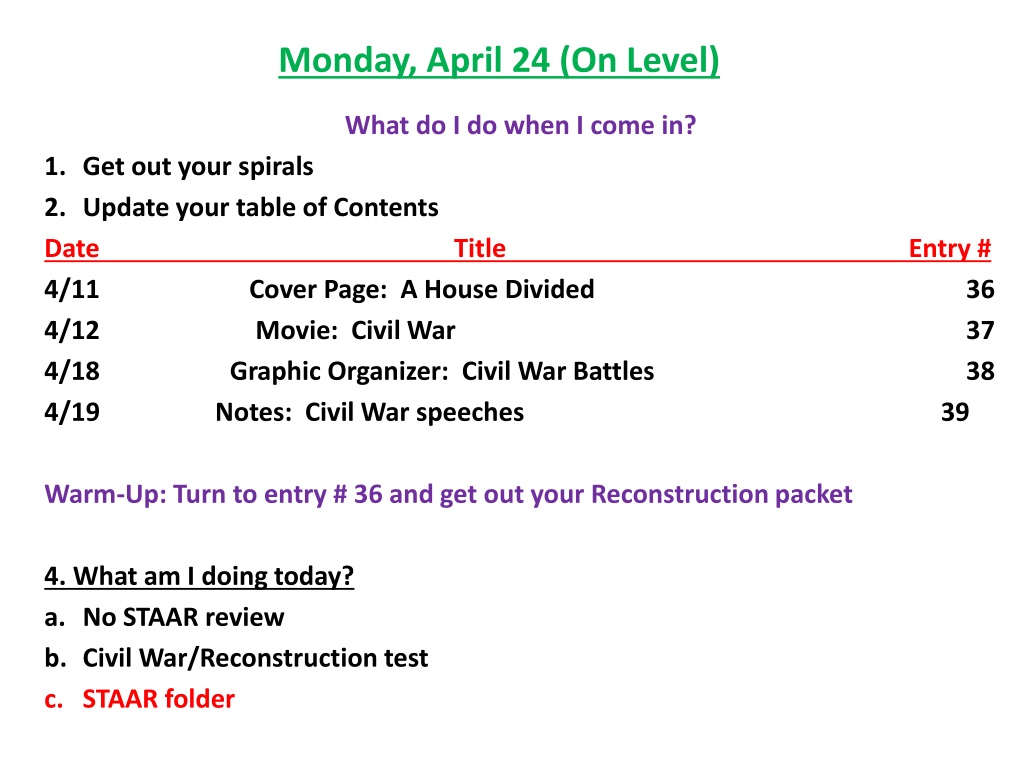

![❤[PDF]⚡ Civil War Talks: Further Reminiscences of George S. Bernard and His Fel](/thumb/20551/pdf-civil-war-talks-further-reminiscences-of-george-s-bernard-and-his-fel.jpg)



